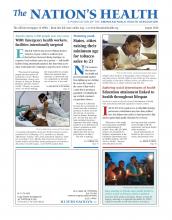From cyberbullying to ineffective zero-tolerance policies, there are many reasons why bullying prevention research must be a public health priority, according to a recent report.
The effects of bullying can have immediate and long-term consequences on physical and psychological health, according to “Preventing Bullying Through Science, Policy and Practice,” a report released in May by the National Academies of Sciences, Engineering and Medicine.
“There are headaches, abdominal pain, sleep problems,” said Frederick Rivara, MD, MPH, chair of the committee that authored the report. “But there’s also psychological problems of anxiety and depression. These can affect social interaction, academic performance and have a long-term impact.”
Bullying is unwanted, repetitive aggressive behavior from a youth or group of youths that can cause various types of harm, such as psychological, according to the Centers for Disease Control and Prevention.
School-based bullying affects between 18 and 31 percent of U.S. youth, the report said. Cyberbullying, which includes taunting and threats via social media such as Facebook or Twitter, affects 7 to 15 percent of U.S. youth.
“The problem with cyberbullying is it’s difficult to find out who’s responsible for trying to control it,” Rivara told The Nation’s Health. “Traditionally, bullying happens in the school or the playground, which are under the watchful eye of adults and jurisdiction of the school. But with cyberbullying, it’s beyond the purview of certainly schools and parents who aren’t aware it’s going on.”
In addition, there are groups at higher risk of being bullied, such as lesbian, gay, bisexual and transgender youth; youth with disabilities; and youth who are overweight or obese, the report said.
“This issue with stigma and bullying needs to be further examined,” Rivara said. “We know with any public health problem, a public health intervention may not be effective for all groups. There may need to be specific interventions to decrease the risk of being bullied.”
The report calls for a need for more evidence-based research to develop anti-bullying policies. Research shows existing policies, such as zero-tolerance measures that involve suspension or expulsion of the bully, may not result in less bullying. Rivara added that there is evidence that state laws can be effective in reducing school bullying, but there is a need for more data. All 50 states and the District of Columbia have either created or revised anti-bullying laws, according to the report.
“There are intervention programs available at the school level and, to some degree, the community level,” Rivara said. “These can be effective. They involve members of the school community, students, teachers, bus drivers, coaches, to create a climate that really discourages bullying and promotes pro social behavior.”
Report authors also recommend seven strategies, including that agencies such as the U.S. Departments of Education and Health and Human Services develop evidence-based anti-bullying programs and that social media companies create and enforce anti-bullying policies to prevent cyberbullying on their platforms.
“An important point to make here is while bullying has existed for eons, society has progressed to realize that we can no longer accept it as a normal part of growing up because it’s not,” Rivara said.
For more information, visit www.nap.edu/catalog/23482/preventing-bullying-through-science-policy-and-practice.
- Copyright The Nation’s Health, American Public Health Association









